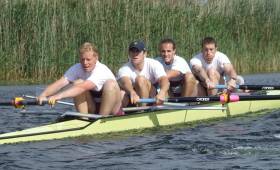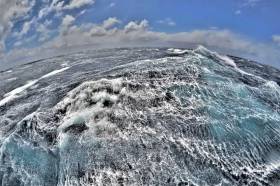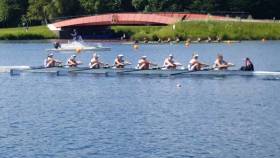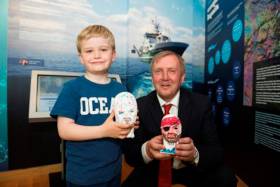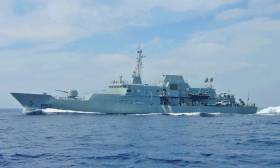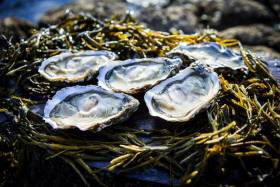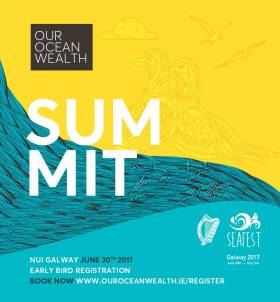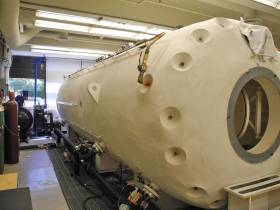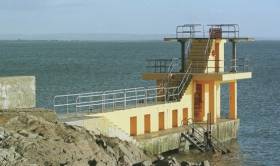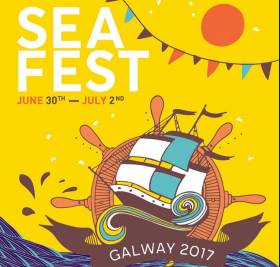Displaying items by tag: Galway
Death of Galway Rowing Stalwart Paul Giblin (34)
#Rowing: Paul Giblin, a hugely successful rower with NUIG/Gráinne Mhaol, has died aged just 34. Giblin had dealt with cancer since 2012 and had undergone a bone marrow transplant in 2015.
His rowing career brought him medals at the World Student Games and the World Under-23 Championships, but he will be best known as a powerful member of the remarkable senior eight and senior fours from NUIG/Gráinne Mhaol. He was part of senior eights wins at the Irish Championships in 2002, 2006, 2009 and 2010, and senior coxless fours wins in 2002, 2003, 2004, 2005, 2006, 2007 and 2009 and 2010. In all, Paul Giblin amassed 17 Irish senior championship wins. He won titles racing in all four seats of the coxless four.
He also competed as a cyclist with Galway Bay Cycling club and took part in Rás Tailteann in 2010.
The Galway man, who was a Lieutenant in the Irish Army will be buried on Wednesday after mass at at St Oliver Plunkett Church in Renmore.
#OurOceanWealth - Maritime Alliance executive director Greg Murphy will provide insights into the success of the US ‘blue tech’ cluster for the Irish marine sector in his keynote address at the Our Ocean Wealth Summit later this month.
Murphy heads a list of speakers announced to coincide with World Oceans Day (Thursday 8 June) for the summit on Friday 30 June at NUI Galway, which will focus on the theme of ‘Rethinking Boundaries and Innovation for a Sustainable Marine Economy’ and where delegates will also receive a progress update on Ireland’s Integrated Marine Plan - Harnessing Our Ocean Wealth.
Terry Garcia, principal at Exploration Ventures LLC and former chief science and exploration officer at National Geographic, will lead discussions on the overwhelming and urgent imperative to innovate arising from our changing oceans.
Bringing Ireland’s blue economy into focus, Dan O'Brien, chief economist for the Institute of International and European Affairs, is addressing a number of topics from the Irish seafood sector, sustainability and economic development in coastal regions to the impact of the Wild Atlantic Way coastal tourism initiative.
Also on the speaker list are representatives from GEOMAR, PwC and Statoil as well as national speakers and panellists including Bord Bia CEO Tara McCarthy and Fáilte Ireland’s head of the Wild Atlantic Way programme, Fiona Monaghan, among others.
They join previously announced innovation expert Tom Kelley, of award-winning global design and development firm IDEO, who will address the summit on encouraging leaders in Ireland’s marine sector to engage in creative thinking.
Moderated by broadcaster and journalist Olivia O’Leary, this year’s Our Ocean Wealth Summit offers a platform for global and national leaders from across the marine industry and related sectors to convene and collaborate on innovating for our marine future.
“Our ocean is a national asset and supports a diverse economy,” says Marine Institute chief executive Dr Peter Heffernan said. “There are many success stories from businesses, from a range of sectors, about how they have responded to the opportunities provided by the ocean.
“To enable our marine potential to be realised, it is essential that we seek new approaches and ways of thinking to harness the boundless opportunities that exist in our marine industry.
“At this year's summit, delegates will be inspired by those leading the way in driving innovation to continue developing a sustainable marine economy for Ireland.”
A number of related marine industry and research events will also be held around the summit on Thursday 29 and Friday 30 June, including the Digital Ocean Conference and the Marine Trade Show.
The Our Ocean Wealth Summit sponsored by PwC and related events are held as part of SeaFest 2017, Ireland’s national maritime festival, from 30 June to 2 July in Galway. For the full summit programme and to register visit www.ouroceanwealth.ie/register
NUIG Women's Eight Impress At Metropolitan Regatta
#Rowing: Irish crews had a very successful second day at the Metropolitan Regatta at Dorney Lake. Monika Dukarska of Killorglin and the Skibbereen double of Denise Walsh and Aoife Casey won in the top single and double sculls races, but other crews also impressed. NUIG’s women’s eight finished third in the A Final in Tier One – the crew, which has a number of novice rowers, had also taken third in the morning time trial. Trinity, UCC, Shandon, Galway, Cork and UCD were amongst the crews which also came away with encouraging results over the weekend.
Metropolitan Regatta, Dorney Lake, Day Two (Selected Results; Irish interest)
Men
Eights – Tier One, Final B: 2 NUIG A, 3 UCD (A). Final C: 1 Trinity 6:07.65. Final D: 2 UCD. Final F: 1 NUIG (B) 6:25.61. Final I: 2 Trinity (D), 3 UCD (C).
Four – Tier Three Final: 1 UCC 6:36.53.
Four, coxed – Championship Final: 3 NUIG (B).
Pair – Tier Two Final: 2 UCC
Sculling, Double
Tier Two Final: 2 Shandon
Women
Eight – Tier One – Final A: 3 NUIG (A). Final B: 2 Commercial. Final C: 3 Galway. Final D: 2 NUIG.
Four, coxed – Tier Three: 3 Galway Rowing Club.
Pair - Tier One Final: 2 Cork (G Collins, L Dilleen)
Sculling, Double – Tier One Final: 1 Skibbereen 7:17.56.
Single – Tier One: 1 Killorglin (M Dukarska); 3 UCD (A Crowley).
#MarineScience - Marine Minister Michael Creed fficially opened Ireland's first sea science gallery at Galway City Museum yesterday (Thursday 18 May).
‘Sea Science - the Wild Atlantic’ is Ireland’s first marine science exhibition to have audio and visual displays accessible in both English and as Gaeilge.
The interactive exhibition spans a variety of topics including the nature of how tides operate, multi-beam mapping, deep sea exploration and marine life along the seashore, using a combination of digital interactive touch screens, hands-on-exhibits, holograms and high-definition video footage.
“I’m delighted to officially open Ireland’s first marine science gallery at Galway City Museum, an exhibition that both strengthens our maritime identity and raises awareness about our oceans,” said Minister Creed.
“For an island nation like Ireland, the sea has particular importance to our history and culture, as well as supporting a diverse marine economy. Our ocean is a valuable source of food, a gateway for shipping and means of transport, as well as supporting diverse ecosystems. For many of Ireland’s coastal communities, our ocean also offers tourism and leisure opportunities which contribute to our health and wellbeing.
“Our ocean is indeed a vital resource, and it is imperative to cultivate an interest in our oceans from a young age.”
Dr Peter Heffernan CEO of the Marine Institute said, "Ireland has a rich maritime heritage, from a seafaring history to researching and preserving our marine environment. Our ocean is a national asset and a key aspect of Ireland’s marine plan, Harnessing Our Ocean Wealth, is to ensure our marine resource generates social, cultural and economic benefits for all our citizens.
Marine Institute chief executive Dr Peter Heffernan added: “To realise Ireland’s marine potential, it’s incredibly important to have an ocean literate society – a population that has a strong understanding of the marine environment and how it impacts our everyday lives.
“To understand the value of our oceans, citizens need to engage with the marine environment from a young age. This exhibition provides a stimulating learning environment for children to discover the mysteries and science of our oceans, and to also inspire our next generation of marine entrepreneurs, explorers and scientists.”
The opening of ‘Sea Science - the Wild Atlantic’ coincides with the launch of SeaFest 2017, Ireland’s national maritime festival, which runs from Friday 30 June to Sunday 2 July.
Volunteers are still wanted for the three-day event, as previously reported on Afloat.ie.
SeaFest Expands To Three-Day Celebration In 2017
#SeaFest - Organisers promise “a larger and more spectacular” SeaFest, as Ireland’s national maritime festival expands to include three days of activities and attractions celebrating the sea in Galway from 30 June to 2 July.
Festival chiefs met in Galway City Hall on Thursday 23 March to plan the SeaFest 2017 programme, intending to attract an even bigger number than the 60,000 who attended last summer.
“Galway Harbour will be a hub of activity for three days, featuring even more activities for children, aquatic displays, vessel tours, as well as exhibitions and entertainment,” said Marine Institute chief executive Dr Heffernan.
“Ireland’s marine infrastructure and resources will be on show, and visitors will also have the opportunity to celebrate our maritime history and discover more about our oceans.
“SeaFest also raises public awareness of the value of our marine resources and the economic benefits our ocean provides to Galway and all of Ireland’s coastal communities.”
Donal Maguire, Bord Iascaigh Mhara (BIM) director of aquaculture development Services, said BIM is delighted to be taking part in SeaFest 2017, promising the return of last year’s popular Big Top on the Docks.
“Our Big Top will be a wealth of family friendly fun information on all things relating to Ireland’s fishing, fish farming and overall seafood sectors, from cookery demonstrations to exciting interactive games and puzzles for the kids,” he said.
Naval Service vessel LÉ Niamh was popular with crowds last year, and an even bigger display is planned for SeaFest 2017. World-famous tall ship The Phoenix will again return to Galway Harbour, and visitors will also enjoy tours of Marine Institute vessels the Celtic Explorer and Celtic Voyager.
SeaFest 2017 is supported by BIM, the Department of Defence, Galway City Council, Galway County Council, NUI Galway, Bord Bia Irish Food Board, Port of Galway, Western Development Commission, Galway Chamber, The Village Salthill and Latin Quarter Galway.
Dr Peter Heffernan said collaboration with the festival’s partners is key to SeaFest’s success.
As well as the public festivities, the fourth annual Our Ocean Wealth Summit will be held on 30 June at NUI Galway. National and international delegates will discuss how Ireland is transforming its marine sector through new thinking to achieve economic prosperity and to protect marine resources for the future.
Galway Hosts Shellfish Safety Conference This May
#Shellfish - Galway will host the 11th International Conference on Molluscan Shellfish Safety (ICMSS 2017) this summer from Sunday 14 to Thursday 18 May.
ICMSS 2017 will be hosted by the Marine Institute in association with the Food Safety Authority of Ireland, Sea Fisheries Protection Authority, Irish Shellfish Association, National University of Ireland and Bord Iascaigh Mhara in the Bailey Allen Hall at NUI Galway.
This 11th conference in the biannual forum series, subtitled ‘Protecting consumers, assuring supply, growing confidence’, offers an important multidisciplinary interface between regulatory, scientific and industrial representatives of the international molluscan food safety community. Unusual, emerging and novel shellfish risk factors will be discussed, offering new information and solutions.
ICMSS 2017 will include keynote presentations from acclaimed international experts in the area. A series of workshops will be held in conjunction with the event on Friday 19 and Saturday 20 May which will be of particular interest to shellfish safety professionals and students, including microbiologists, toxin chemists, toxicologists, marine scientists, regulators, policy makers, food safety specialists, environmental health officials, engineers, environmental managers, academics and undergraduate and postgraduate students.
More information can be found on the ICMSS 2017 website. The programme is available to as a PDF to read or download HERE.
Early Bird Registration Now Open For Our Ocean Wealth Summit
#OurOceanWealth - Early bird registration is now open for the fourth annual Our Ocean Wealth Summit, which takes place on Friday 30 June at NUI Galway.
Global and national leaders from across the marine sector are set to convene and collaborate on innovating for our marine future, at this year’s summit, reflecting on innovation for a sustainable marine economy in a landscape of global turbulence and dynamic, disruptive technological, social and political change.
The summit is specifically targeted at national maritime stakeholders, from policy makers, industry representatives, and businesses to Government departments and agencies, NGOs, academics and researchers, and is increasingly attracting international attention.
In addition, the summit — an initiative of the Government's inter-departmental Marine Coordination Group — will review progress to date on Ireland's Integrated Marine Plan, Harnessing Our Ocean Wealth.
A full agenda for this year's Our Ocean Wealth Summit will be available in the coming weeks. Outline sessions include:
Session A: Progress on Harnessing Our Ocean Wealth
The objective of this session is to provide a platform whereby tangible progress towards the goals of Harnessing Our Ocean Wealth, the national maritime plan for Ireland, can be announced.
Session B: The Drive for Innovation
This session is intended to highlight to the audience the global context in which efforts to transform Ireland's marine industry must take place.
Session C: Smarter and Better
This session will examine how Ireland's established economic sectors, such as the food sector, can turn their attention to the sea. The session is designed to highlight that Ireland has key sectors of strength and expertise operating on a global playing field, which if matched to the marine resource, can be drivers for growth.
Session D: The Coastal Economy
This session will move the focus of the summit from the global perspective to one more focused on the Irish economy, using marine tourism and coastal enterprise as a case study to pose the question "How can Ireland innovate in marine tourism and leisure?".
Session E: Our Rapidly Changing Oceans
Designed to bring the summit full circle, this session will reflect on the ways in which innovation is possible and the benefits it can bring. Participants will also consider the overwhelming and urgent imperative to innovate arising from our changing oceans.
A number of related industry, innovation and research events will also take place on Thursday 29 June in advance of the summit, which is an integral part of Ireland's national maritime festival, SeaFest, in Galway from 29 June to 2 July.
To secure your place at this year’s summit, register now at www.ouroceanwealth.ie/register. See the website for more information or follow @OurOceanWealth on Twitter.
Galway Earmarked For Hyperbaric Therapy Centre
#Diving - Planning permission is being sought for a new hyperbaric therapy centre in Galway city centre, as Galway Bay FM reports.
Regularly used for the treatment of damaged body tissues, hyperbaric facilities are also key to the treatment of decompression sickness, or ‘the bends’ – a risk for deepwater divers.
Last November, Cork’s SCUBA diving community announced plans to raise funds for a local hyperbaric chamber, as previously reported on Afloat.ie.
Talks Over Return Of Blackrock Tower Liferaft
#Galway - Irish Water Safety in engaged in talks with Galway City Council over the possibility of reinstating the liferaft at BlackrockDiving Tower.
Councillors last year rejected proposals to replace the amenity after a poor health and safety assessment in 2015, as previously reported on Afloat.ie.
The raft was originally removed from the tower in Salthill in 2014 after it was associated with incidents of falls and near drownings.
But as Galway Bay FM reports, talks have begun in the wake of local public sentiment for the liferaft, with a view to including it in delayed upgrade works on the tower.
SeaFest 2017 in Galway Appoints Organiser for June Maritime Festival
Galway based and globally renowned event management specialist Arcana has been appointed to stage SeaFest, Ireland's national maritime festival, this summer. Arcana, which has organised sporting, cultural and commemorative historical events across the globe, has been given the challenge of staging what is fast becoming Europe's most exciting maritime festival. The company has won the contract to mastermind the programme for this year's extended SeaFest activities in the city dockland / waterfront.
Speaking of their appointment Johnny Donnelly, Managing Director of Arcana said: "We are delighted to have been appointed event managers for Seafest in 2017. We are really excited to be working with the various stakeholders and partners, both locally and nationally, on staging Seafest this Summer. At the heart of what we are planning is to make people's heart race with wonder and joy and also to stop people in their thoughts momentarily to reflect on the wonders of the waters that surround and nourish all our lives. Lots of shimmers and great waves lie ahead. We can't wait!"
SeaFest returns to Galway from 30 June to 2 July 2017. Last year more than 60,000 visitors flocked to the festival to enjoy an action packed programme of free family-friendly events at Galway Docks and an international conference at NUIG. The festival featured, among other events, Galway Hookers challenging for The Galway Plate, tours of the tall ship The Phoenix, seafood cookery demonstrations by celebrity chefs, interactive exhibitions and tours of the Marine Institute's research vessels.
SeaFest is an annual festival, celebrating all things maritime. An initiative of the inter-departmental Marine Coordination Group, SeaFest supports the goals of Harnessing Our Wealth – An Integrated Marine Plan for Ireland in relation to engaging with the sea.


























